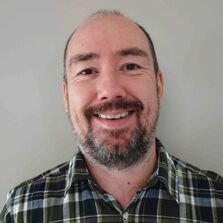TRAUMA THERAPY
Time To Heal
ABOUT ME
Chris Rudyard - MNCPS Accredited & Reg.
Over 20 years professional experience in mental health services
More than 18 years counselling & psychotherapy in professional settings
Fully Insured, Qualified Professional &
Member of Department of Health's' Accredited Register
I'm a counsellor and psychotherapist, trained in many approaches to psychotherapy. I started supporting people who experienced and were injured by trauma in 2002. Since then the field of neuroscience has made huge advances in terms of treatment, and the understanding of trauma. This has greatly influenced my practice and approach to therapy.
I've worked in paid/employed capacities for many organizations. I found I didn't like working for organizations for many reasons. Something I found was that they didn't adapt, they were stuck to old, rigid and unhelpful ways of thinking and supporting people.
From the start of my career, I found that people would tell me about their trauma, maybe not straight away, but we'd get to it. Although counselling seemed to help, I felt there was much they were left with and more healing was possible. For many people isolation and understanding would improve, but they still felt the acuteness of the trauma, people were still 'triggered' and left unhealed. I found working alongside therapists and working with therapists personally that there was an element of shaming and arrogance within these therapies, which are the very things a lot of my clients are coming to me to help recover from.
You may have noticed that I have trained in more approaches than most, partly this was just out of curiosity about other approaches, and the other part was searching for therapies that the pioneers of psychotherapy (Dr. Bessel Van Der Kolk, Dr. Janina Fisher, Pat Ogden, and Dick Schwartz) used. You can see my completed training here:
https://www.trauma-therapy.co.uk/training-experience
Having had CBT and also having completed some training in it, seemed a bit off to me, the approach seemed shallow, suggesting: it's the way we're thinking about it, or that that we aren't doing enough to change. Newer evidence shows healing does not come from the 'way we think' or pushing ourselves to do more...
Person-centred therapy has a belief that the relationship with the therapist should be enough to facilitate change, but I found it only helped some people, and talking about something was not necessarily the answer to healing. Person-centred counselling seemed a very cognitive approach to me. People say it helped them understand, but it didn't change the internal triggers.
Neuroscience suggests that in trauma, what helps has something to do with 'memory consolidation' - the brain re-processing something and allowing it to move to the 'back of the mind'. After a traumatic episode, our brains and bodies need time to process it, and often we don't have or allow this privilege. Only certain therapies have this component, and even fewer therapies have a healing element.
Just because a therapist is 'trauma-informed', doesn't mean that they are trained in therapies designed to treat trauma. Psychotherapy that heals trauma needs to create an internal 'dual-awareness', it needs to be a heavily mindful approach, that incorporates the body/somatic.
My clients have been from many walks of life. I've worked with people with a 'dual diagnosis', and seen many people recover from their history. I now regularly work with people based in the UK & Europe, providing therapy both online and in person.



